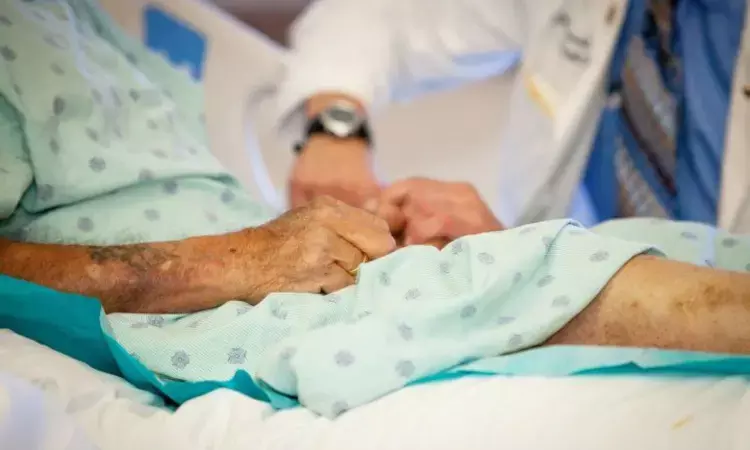- Home
- Medical news & Guidelines
- Anesthesiology
- Cardiology and CTVS
- Critical Care
- Dentistry
- Dermatology
- Diabetes and Endocrinology
- ENT
- Gastroenterology
- Medicine
- Nephrology
- Neurology
- Obstretics-Gynaecology
- Oncology
- Ophthalmology
- Orthopaedics
- Pediatrics-Neonatology
- Psychiatry
- Pulmonology
- Radiology
- Surgery
- Urology
- Laboratory Medicine
- Diet
- Nursing
- Paramedical
- Physiotherapy
- Health news
- Fact Check
- Bone Health Fact Check
- Brain Health Fact Check
- Cancer Related Fact Check
- Child Care Fact Check
- Dental and oral health fact check
- Diabetes and metabolic health fact check
- Diet and Nutrition Fact Check
- Eye and ENT Care Fact Check
- Fitness fact check
- Gut health fact check
- Heart health fact check
- Kidney health fact check
- Medical education fact check
- Men's health fact check
- Respiratory fact check
- Skin and hair care fact check
- Vaccine and Immunization fact check
- Women's health fact check
- AYUSH
- State News
- Andaman and Nicobar Islands
- Andhra Pradesh
- Arunachal Pradesh
- Assam
- Bihar
- Chandigarh
- Chattisgarh
- Dadra and Nagar Haveli
- Daman and Diu
- Delhi
- Goa
- Gujarat
- Haryana
- Himachal Pradesh
- Jammu & Kashmir
- Jharkhand
- Karnataka
- Kerala
- Ladakh
- Lakshadweep
- Madhya Pradesh
- Maharashtra
- Manipur
- Meghalaya
- Mizoram
- Nagaland
- Odisha
- Puducherry
- Punjab
- Rajasthan
- Sikkim
- Tamil Nadu
- Telangana
- Tripura
- Uttar Pradesh
- Uttrakhand
- West Bengal
- Medical Education
- Industry
Case Study: Acute Kidney Injury Post-Pancreatectomy Linked to Oxalate Nephropathy

Senior citizen Medical Support
A recent case study published in the BMC Nephrology reported a 75-year-old man who developed acute kidney injury (AKI) stage 3, as classified by the Kidney Disease: Improving Global Outcomes (KDIGO) criteria, weeks after undergoing Whipple surgery for distal cholangiocarcinoma. This case highlighted the critical connection between post-surgical malabsorption, inadequate pancreatic enzyme replacement therapy and excessive vitamin C intake that leads to oxalate nephropathy, a condition marked by kidney damage due to oxalate crystal deposition.
Following the Whipple procedure the patient experienced a significant decline in kidney function, a complication which initially was confusing to his healthcare providers. The detection of acute kidney injury came at a critical juncture when the patient was due to start adjuvant chemotherapy, that highlighted an unexpected hurdle in his cancer treatment journey. The laboratory tests revealed markedly increased creatinine levels along with an increase in urinary oxalate levels, the absence of the typical signs like the hematuria or leucocyturia.
A meticulous kidney biopsy was instrumental in diagnosing oxalate nephropathy which uncovered the presence of numerous intratubular oxalate crystals, despite their absence in urinalysis. The surgical removal of part of the pancreas led to exocrine pancreatic insufficiency and subsequent fat malabsorption, while the non-compliance of the patient with pancreatic enzyme replacement therapy and daily consumption of vitamin C supplements further exacerbated the condition.
The study underlined the pathophysiology of secondary hyperoxaluria and its progression to oxalate nephropathy which emphasized the need for increased awareness of this condition as a potential cause of acute kidney injury post-pancreatectomy. The secondary hyperoxaluria can stem from increased oxalate or precursor intake, fat malabsorption or diminished intestinal oxalate degradation which often culminates in a perfect storm for patients with specific surgical histories and dietary habits.
The prompt intervention including the resumption of pancreatic enzyme replacement therapy and the introduction of calcium carbonate resulted in the improvement of the patient's kidney function. However, the subsequent advancement of his cancer illuminated the complexities of managing post-surgical complications amidst the ongoing oncological concerns.
This case report contributes significantly to the medical literature by marking as the first reported instance of acute oxalate nephropathy post-pancreatectomy compounded by vitamin C intake. It prompts a reevaluation of post-operative care strategies in ensuring compliance with enzyme replacement therapy and rethinking nutritional supplements in vulnerable patients. Overall, this report emphasizes the importance of considering oxalate nephropathy in differential diagnoses for AKI following the pancreatectomy.
Reference:
Barani, C., Aydin, S., Demoulin, N., & Jadoul, M. (2024). Oxalate nephropathy after pancreaticoduodenectomy: a case report. In BMC Nephrology (Vol. 25, Issue 1). Springer Science and Business Media LLC. https://doi.org/10.1186/s12882-024-03543-9
Neuroscience Masters graduate
Jacinthlyn Sylvia, a Neuroscience Master's graduate from Chennai has worked extensively in deciphering the neurobiology of cognition and motor control in aging. She also has spread-out exposure to Neurosurgery from her Bachelor’s. She is currently involved in active Neuro-Oncology research. She is an upcoming neuroscientist with a fiery passion for writing. Her news cover at Medical Dialogues feature recent discoveries and updates from the healthcare and biomedical research fields. She can be reached at editorial@medicaldialogues.in
Dr Kamal Kant Kohli-MBBS, DTCD- a chest specialist with more than 30 years of practice and a flair for writing clinical articles, Dr Kamal Kant Kohli joined Medical Dialogues as a Chief Editor of Medical News. Besides writing articles, as an editor, he proofreads and verifies all the medical content published on Medical Dialogues including those coming from journals, studies,medical conferences,guidelines etc. Email: drkohli@medicaldialogues.in. Contact no. 011-43720751


